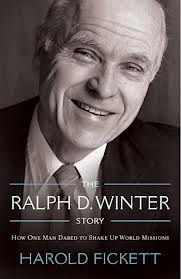Ralph Winter: Outspoken, Focused, and Fearless
The Ralph D. Winter Story by Harold Fickett (Kindle Version)
While the book tended to enthusiastically go long on Winter’s theories towards the end, I closed the last page inspired to persevere in my own field. The Ralph D Winter Story was written by a friend of his who lovingly shared about Winter’s life. How did it inspire me?
- “He had to grow into his own identity, see its usefulness, and then embrace it despite
 what others might think. This took a long period of acting on what he did without seeing the big picture.” As I raise support to serve in this new field, I am stepping into the unknown and wondering what this will all look like when I am at 100% support. Right now, God is moving the pieces in place, and while I wait, I am serving at a day job where God has placed me. It is my intent to serve them honorably so they succeed. I am learning a lot in my day job. While working the day job, I am talking to numerous people about what I do with WorldVenture. This often gets a variety of responses. The reason it takes so long to raise support is because of people who need help seeing the vision more clearly on what a social media ministry may look like and how it can help the church.
what others might think. This took a long period of acting on what he did without seeing the big picture.” As I raise support to serve in this new field, I am stepping into the unknown and wondering what this will all look like when I am at 100% support. Right now, God is moving the pieces in place, and while I wait, I am serving at a day job where God has placed me. It is my intent to serve them honorably so they succeed. I am learning a lot in my day job. While working the day job, I am talking to numerous people about what I do with WorldVenture. This often gets a variety of responses. The reason it takes so long to raise support is because of people who need help seeing the vision more clearly on what a social media ministry may look like and how it can help the church. - “That was who Ralph was. After a lifetime of zeroing in on this elusive identity, he used virtually every moment of his last years to live it out without compromise, and without regard for the consequences.” A ministry that compromises on total obedience doesn’t succeed. Keeping the vision ever in front of me, I intend to get to 100% support so I can put myself fully into this work. My husband says, I am catching up on wasted years. This is true. I want the rest of my life to reflect the growing faith in the Lord and to share the hope and joy we have in Jesus with others. This will be done on a variety of media and in the face-to-face world.
- “Ralph’s sense of life as a spiritual battle deepened.” Winter pursued the theory of evil intelligent design following his wife’s death to open up conversation with those who believe in intelligent design. What he meant by this was to pray against the evil of disease. If an intelligent designer like God created the world, what if Satan uses “intelligent design” to create the viruses, diseases, and death in the world to fight God? In my own journey, I could share stories on what I felt was evil targeting us as we worked to serve with WorldVenture more strategically and whole-heartedly. This new direction in my life is different from any other program or act of service.
- Conflict and disagreement will happen, even in the best of organizations. Winter had his conflicts. He was outspoken. His theories weren’t always welcome, and his mannerisms were said in the book to offend people. In Guatemala, a nurse didn’t welcome his ideas on cross-cultural communication. She followed closely with traditional approaches. What if the church explored the creative side of evangelism and missions and supported this financially, prayerfully, and actively through implementation? We can support solid truths by simply changing how we share those truths.
No matter what obstacles I face, I am praying Matthew 4:19 (CEB) for the Lord to continue to show me HOW to reach those with no hope, no joy, and no future with the Good News of the Gospel. A former pastor once said that a person coming to love the Lord is a “supernatural miracle.” We must first serve on our knees, before we serve with our hands.
Support this vision by clicking here. Or to schedule an appointment with me, leave a comment or use the comment form here to connect with me. It would give me joy to share the full vision with you.






